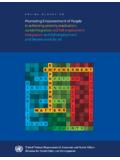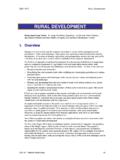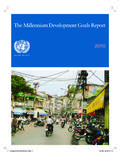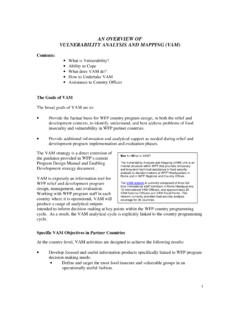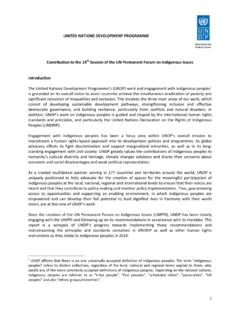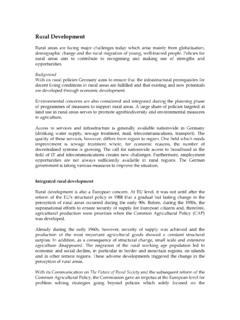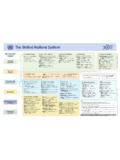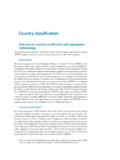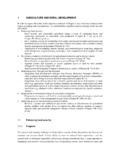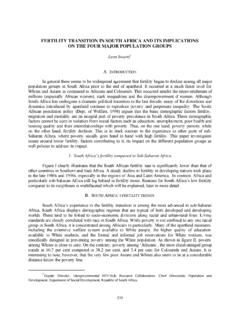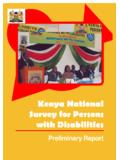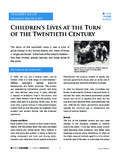Transcription of Youth and Political Participation 2013-11-15 - United Nations
1 They can be a creative force, a dynamic source of innovations, and they have undoubtedly, throughout history, participated, contributed, and even catalyzed important changes in Political systems, power-sharing dynamics and economic opportunities. However, Youth also face poverty, barriers to education, multiple forms of discrimination and limited employment prospects and opportunities. Youth , Governance and Participation Major issues Since the Arab Awakening many Youth in the region have remained politically active through Political movements instead of engaging with and in Political parties.
2 Young men and women are traditionally active politically in universities (when allowed) but very often disillusioned with Political leadership and Political institutions and excluded from policy development. As a result, Political activism of Youth is not organized according to formal groupings. Opportunities for Youth to engage in governance and participate in Political and decision-making processes depend largely on the Political , socioeconomic, and cultural contexts where social norms in many parts of the world result in multiple forms of discrimination against young women.
3 Both formal and informal engagement can be understood as Political Participation , and both are beneficial for a vivid and resilient democracy and should be supported. 4 There is strong evidence that the Participation of young people in formal, institutional Political processes is relatively low when compared to older citizens across the globe. This challenges the representativeness of the Political system and leads to the disenfranchisement of young people. 1 UNDP (2012) Enhancing Youth Political Participation throughout the Electoral Cycle 2 UNDP and IPU, (2012) Global Parliamentary Report 3 UNDP and IPU, (2012) Global Parliamentary Report 4 UNDP (2012) Enhancing Youth Political Participation throughout the Electoral Cycle HIGHLIGHTS In the area of Political Participation , in a third of countries, eligibility for national parliament starts at 25 years old or older1.
4 Of parliamentarians around the world are in their 20s and % are in their 30s2. The average age of parliamentarians globally is 53 (50 years old for women parliamentarians)3. Young people between the ages of 15 and 25 constitute a fifth of the world s population. Youth , Political Participation AND DECISION-MAKING Youth and Political Participation Page2 The focus on Youth , in terms of their engagement in the Political arena, is a relatively new priority but extremely timely, particularly in light of recent events and democratic transitions, in the Arab States as well as other regions.
5 The World Programme of Action for Youth for 2000 and beyond 5 touched upon the importance of Youth Participation in decision-making, but did not offer concrete interventions at the time. People under the age of 35 are rarely found in formal Political leadership positions. In a third of countries, eligibility for the national parliament starts at 25 years or higher and it is common practice to refer to politicians as young if they are below 35-40 years of Youth is not represented adequately in formal Political institutions and processes such as Parliaments, Political parties, elections, and public administrations.
6 The situation is even more difficult for both young women as well as women at mid-level and decision-making/leadership positions. In order to respond to the needs of young people, and to guarantee that their basic human rights are recognized and enforced, young people s active and meaningful Participation in their societies and in democratic practices and processes is of crucial importance7. Meaningful Youth Participation and leadership require that young people and young people-led organizations have opportunities, capacities, and benefit from an enabling environment and relevant evidence-based programmes and policies at all levels.
7 Realizing young people s right to participate8 and be included in democratic processes and practices is also vital to ensure the achievement of internationally agreed development goals and to refresh the development agenda. In a survey conducted by the UN IANYD in August 2012, a majority of 13,000 respondents expressing their voices from 186 countries highlighted that the main challenges for Youth were limited opportunities for effective Participation in decision-making processes.
8 With limited opportunities and exposure to meaningfully participate in inclusive decision-making processes, young men and women feel excluded and marginalized in their societies and communities. The need for participatory structures and greater trust between Youth and institutions and for greater capacity development were also stressed. Efforts should also be made to focus on the most vulnerable of young people, including via specific actions targeting young women. In countries emerging from conflicts, UNDP recognizes that young people can engage in peace-building, leading non-violent revolutions, using new technologies to mobilize societies to bring about change.
9 Young people have demonstrated the potential to build bridges across communities, working together, helping to manage conflict and promote peace. Young people are vital stakeholders in conflict and in peace-building, and can be agents of change and provide a foundation for rebuilding lives and communities, contributing to a more just and peaceful society 5 6 Enhancing Youth Political Participation throughout the Electoral Cycle, A Good Practice Guide, UNDP, December 2012.
10 7 Page XXXV, World Youth Report 2007, Young People s Transition to Adulthood: Progress and Challenges, UN DESA, 2007 8 Participation is one of the guiding principles of the Universal Declaration of Human Rights, and young people s right to Participation has been deemed important in numerous international agreements. For instance in 1994, 179 countries recognized the importance of ensuring young people s integration and Participation in all spheres of society, including Participation in the Political process and in preparation for leadership roles.
